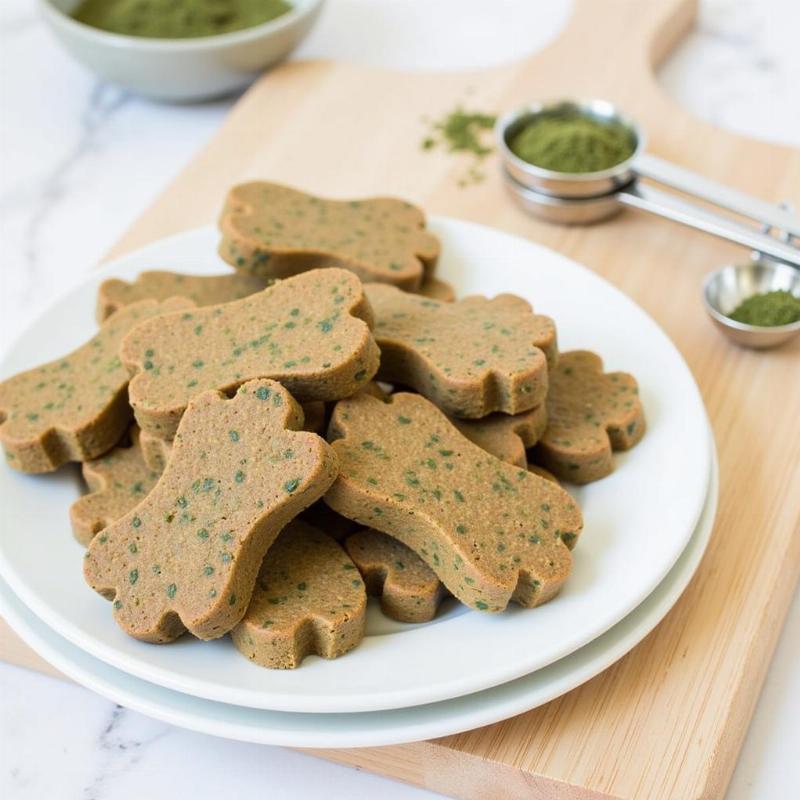Kelp powder for dogs has become increasingly popular amongst pet owners looking for natural ways to boost their furry friend’s health. But with so many options available, finding the best kelp powder for your dog can be overwhelming. This guide will cover everything you need to know about kelp powder, from its benefits to choosing the right product and incorporating it into your dog’s diet.
Understanding the Benefits of Kelp Powder for Dogs
Kelp, a type of seaweed, is packed with essential vitamins and minerals that can significantly benefit your dog’s overall health. It’s a rich source of iodine, which is crucial for proper thyroid function. Kelp also contains other vital nutrients like iron, magnesium, potassium, and calcium, contributing to healthy bones, muscles, and a robust immune system. Additionally, kelp is a natural source of antioxidants, which can help protect your dog’s cells from damage caused by free radicals. Many dog owners report improved coat health, increased energy levels, and better digestion in their dogs after adding kelp powder to their diet.
Choosing the Right Kelp Powder for Your Dog
When selecting a kelp powder supplement for your dog, look for products sourced from clean, unpolluted waters. Opt for organic and sustainably harvested kelp whenever possible. Check the ingredient list to ensure it’s pure kelp powder without any unnecessary additives or fillers. It’s also important to consider the form of kelp powder. Some brands offer granules, while others are finely ground. Granules may be easier to mix into food, while finely ground powder can be sprinkled on top or added to homemade treats.
How to Introduce Kelp Powder to Your Dog’s Diet
Start with a small amount of kelp powder, gradually increasing the dosage over several days to allow your dog’s digestive system to adjust. You can mix the powder directly into their food, sprinkle it on top, or incorporate it into homemade dog treats. Always follow the manufacturer’s recommended dosage guidelines based on your dog’s weight and breed. It’s essential to consult your veterinarian before adding any new supplements to your dog’s diet, especially if your dog has any pre-existing health conditions.
Potential Side Effects and Precautions
While kelp powder is generally safe for dogs, excessive iodine intake can lead to thyroid problems. Therefore, it’s crucial to stick to the recommended dosage. Some dogs might experience mild digestive upset, such as diarrhea or vomiting, when first introduced to kelp powder. If you notice any adverse reactions, discontinue use and consult your veterinarian.
 Kelp Powder Dog Treats
Kelp Powder Dog Treats
Addressing Common Concerns about Kelp Powder for Dogs
Some dog owners worry about the potential for heavy metal contamination in kelp. Choosing reputable brands that conduct third-party testing for purity and heavy metals can alleviate this concern. Another concern is the taste. While some dogs enjoy the slightly salty flavor of kelp, others might be more hesitant. Mixing it thoroughly with their food or incorporating it into flavorful treats can help mask the taste.
Conclusion
Kelp powder can be a valuable addition to your dog’s diet, offering a natural boost of essential vitamins and minerals. By choosing a high-quality product and following the recommended dosage guidelines, you can help support your dog’s overall health and well-being. Remember to consult your veterinarian before starting any new supplement.
FAQ
- Is kelp powder safe for puppies? Yes, kelp powder can be given to puppies, but it’s essential to start with a very small dose and consult your veterinarian for the appropriate amount.
- Can kelp powder help with my dog’s allergies? While some anecdotal evidence suggests kelp powder might help with allergies, more research is needed. It’s always best to discuss allergy concerns with your vet.
- How long does it take to see results from kelp powder? The timeframe for noticeable results varies depending on the dog and the reason for using kelp powder. Some owners report seeing improvements in coat health and energy levels within a few weeks.
- What is the best way to store kelp powder? Store kelp powder in a cool, dry place away from direct sunlight to maintain its freshness and potency.
- Can I give my dog too much kelp powder? Yes, excessive iodine intake can be harmful. Always follow the recommended dosage guidelines.
- What should I do if my dog has an adverse reaction to kelp powder? Discontinue use immediately and consult your veterinarian.
- Are there any dog breeds that shouldn’t have kelp powder? Dogs with thyroid conditions should not consume kelp powder without veterinary approval.
Beautdogs.us is your premier online destination for comprehensive dog care information and resources. We offer expert advice on breeds, nutrition, grooming, training, and overall wellness, catering to both new and experienced dog owners. Our aim is to empower you with the knowledge and tools to provide the best possible care for your beloved canine companion. For further assistance or personalized guidance, reach out to our team at [email protected] or call us at +1 501-555-7529. Beautdogs.us is committed to helping you navigate the joys and responsibilities of dog ownership with confidence and expertise.